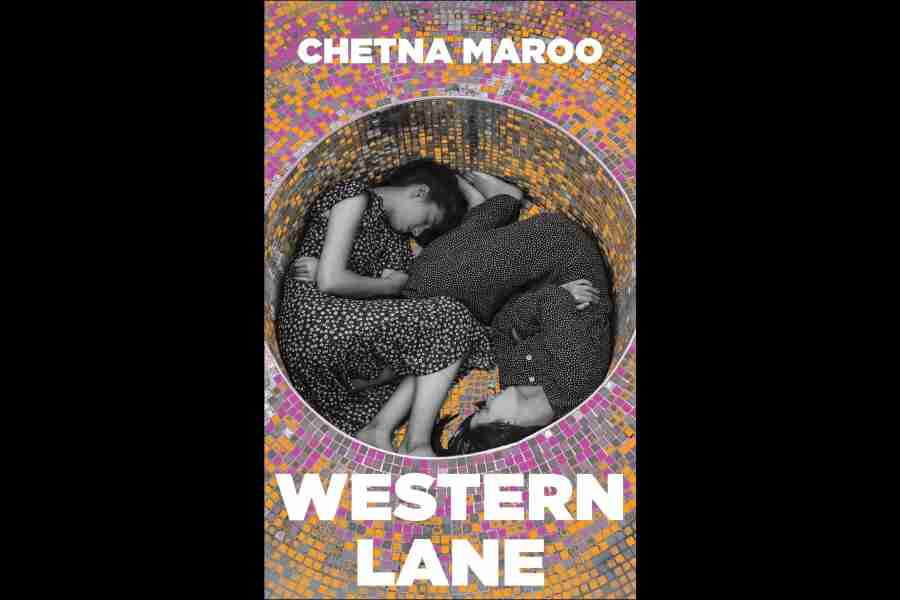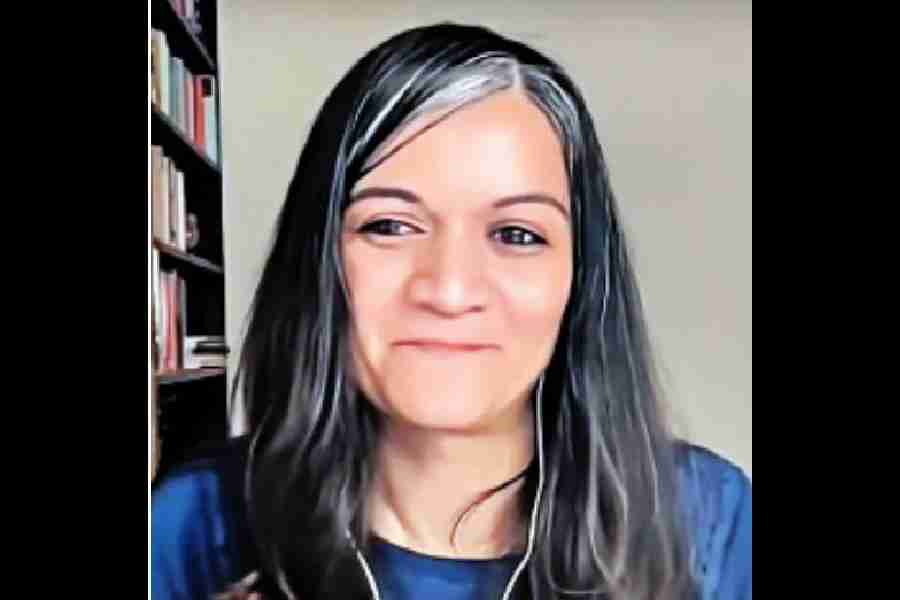Author Chetna Maroo, in the opening pages of her debut novel Western Lane, strategically situates her protagonist, 11-year-old Gopi, in a landscape of quiet terror: her mother’s death. Bereft of drama and bitterness, the tonal quality of the 176-page telling is like the cool white chiselled marble statues of the Dilwara Temple in Rajasthan, reflecting the hurly-burly of life in the stillness of coming to grips with indelible sorrow.
Focused on contained grief and the ever-looming question of how to survive this seismic event, the game of squash becomes the brutal battleground where Gopi must toil to learn how to survive. Gopi has a gift for the game of squash and, in a strange way, the game and her building a visceral dynamic with discipline and rigorous practice helps her ever so slowly to come to terms with the grief she encounters relentlessly.
Her trump card is her father, who champions her with immense respect and understanding, but inevitably also pushes her very hard to excel and take up the challenge of competitive squash. Gopi has three other sisters who at first converge and then after their mother’s death, diverge. Squash becomes a kind of a formidable character in the book — to understand the language of squash she opens her inner doors to figure out the death of her mother.
Little Gopi’s father, who is trying to deal with the loss of a wife whom he loved very much, finds succour in the excellence and rigour with which Gopi approaches competitive squash. It is a new language for her, and the rhythm of the game becomes a means to understanding and celebrating the deep affection her mother and she had for each other.
“Pa said I want you to become interested in something you can do for your whole life,” says Maroo, when the four adolescent girls had just lost their mother.
The irony is that when death and dealing with such a seismic event as a mother’s death is snapping at their heels, the father makes such a sweeping statement of permanency, that he wishes to leave his daughters with a sense of immense positivity and permanence of having something meaningful that they will do forever, as long as they live.
In contrast to such an undergirding of death and permanent loss, Gopi’s father’s words are overwhelming. By providing a means for young Gopi to configure her identity both as a displaced diasporic Gujarati with inadequate knowledge of her mother tongue and generate a dialogue between Gopi and the ‘language’ of squash, her father is showing her how to move between ‘languages’.
The enormous physical demands on Gopi with the exacting hours of practice foisted upon her and the pressure to be a winner takes its toll on her and at poignant moments the game is decimating in nature, leaving Gopi exhausted and sick. So, Maroo adeptly presents both sides of a game which could be demanding when it is allowed to control the player.
Maroo confesses in her sparse discussions on her writing process that she was kept honest by the first pages of the novel. Whenever she felt she was moving away from her own voice, which is strongest at the beginning of the novel, she would read the first pages of her novel aloud. That seemed to be an excellent panacea for staying on track.
Edward Said’s analysis of diasporic individuals, and intellectuals, particularly, makes us read Western Lane, written by a doubly diasporic immigrant even sharper and more relevant. According to Said: “Exiles feel, therefore, an urgent need to reconstitute their broken lives, usually by choosing to see themselves as part of a triumphant ideology or a restored people. The term ‘translation’ is not to describe a transaction between texts and languages but in the etymological sense of being carried across from one place to another. He uses translation metaphorically to describe the condition of the contemporary world, a world in which millions migrate and change their location every day. In such a world, translation is fundamental.”

Western Lane by Chetna Maroo
In a rare conversation Maroo had last week with Book Passage, she said: “When she (the mother) was alive, the girls struggled to communicate with her in some way because the family was Gujarati and the girls would speak to her in Gujarati, while the aunts and uncles would speak to them in English. Because the mother’s English wasn’t good enough and their Gujarati wasn’t great so they would find themselves getting really physical when they communicated with her — watching her and getting physically close to her.”
The language barrier meant they “pulled at her, pushed into her, made ourselves physical in her presence”. That, in itself, was a physical language with words, that signify formidable meanings. And then after the death of their mother, Pa was trying to give them another language which was the language of sport — of the squash court. Pa had played squash when he was young and he was trying to pass on the language of squash, its rhythms — to the girls. That’s another thing he is trying to give the girls.”
At this point, it is useful to invoke a great novelist of our times, the Booker Prize nominee, Australian David Malouf, who says in the novel Ransom: “Words are powerful. They too can be the agents of what is new, of what is conceivable and can be thought and let loose upon the world.”
Maroo is also a keen observer of human behaviour and the nature of things. Her attentiveness and highly sensitised observant nature bring little nuances to life. Gopi is drawn to her contemporary, 13-year-old Ged’s stammering because “it seemed like you were drifting close to him in the silence”.
When Gopi occasionally remembers something about her mother, it is visceral — watching Wimbledon while eating strawberries with sugar.We are introduced at the outset to the rhythm of squash in Gopi’s recollection: “I don’t know if you have ever stood in the middle of a squash court — on the T — and listened to what is going on next door. What I’m thinking of is the sound from the next court of a ball hit clean and hard. It’s a quick, low pistol-shot of a sound, with a close echo. The echo, which is the ball striking the wall of the court, is louder than the shot itself. This is what I hear when I remember the year after our mother died, and our father had us practising at Western Lane two, three, four hours a day.”
The idea of a sport and its rhythms building an echo in the psyche of writers who are diasporic has been seen before — I am thinking of celebrated British writer Zadie Smith’s haunting story The Embassy of Cambodia where the rhythmic sound of the shuttle cock in a badminton court becomes the language of serve and smash. In it, the young single woman Fatou is also dealing with sorrow — the separation from her homeland and her father who also sacrificed a great deal for her.
Like Smith, before her, Maroo creates silences between shots and the echo of the returning shots is a lingua scape. Generally known as intertextuality, or the relationship between texts, the chiming of the shuttlecock in badminton and the hard rubber squash ball underline the kindred spirit that postcolonial, globalised immigrant writers share in their seeking a comfort zone to negotiate a loss of identity, grief or separation. The influences of authors on each other in their choice of metaphors or the style of narrative is a form of osmosis.

Chetna Maroo
In Word, Dialogue, and Novel Kristeva spoke about traditional notions of the author’s “influences”; and the text’s “sources”; positing that all signifying systems, from table settings to poems, are constituted by the manner in which they transform earlier signifying systems. Therefore, perhaps the best definition of intertextuality would be the use of complex literary relationships as a means of communication. It subverts the concept of the text as a self-sufficient, hermetic totality, foregrounding in its stead the fact that all literary production takes place in the presence of other texts.
With the persistent tides of globalisation of cultures, as geographies of encounter bring how we think about our legacies, histories and wisdomtogether, more and more Western ideas will find echoes in Eastern tellings, as will Eastern wisdom be celebrated in Western creations. As intertextuality grows and transformations become easier with the translation of ideas, stories will hopefully make for a special space of sharing and grace in a fragmented world. Chetna Maroo has activated a new way to create a fascinating language of hope and courage. In the annals of the game of squash, Western Lane will be a new page to turn.
Julie Banerjee Mehta is an author of Dance of Life and co-author of the bestselling biography Strongman: The Extraordinary Life of Hun Sen. She has a PhD in English and South Asian Studies from the University of Toronto, where she taught World Literature and Postcolonial Literature for many years. She currently lives in Calcutta and teaches Masters English at Loreto College.











